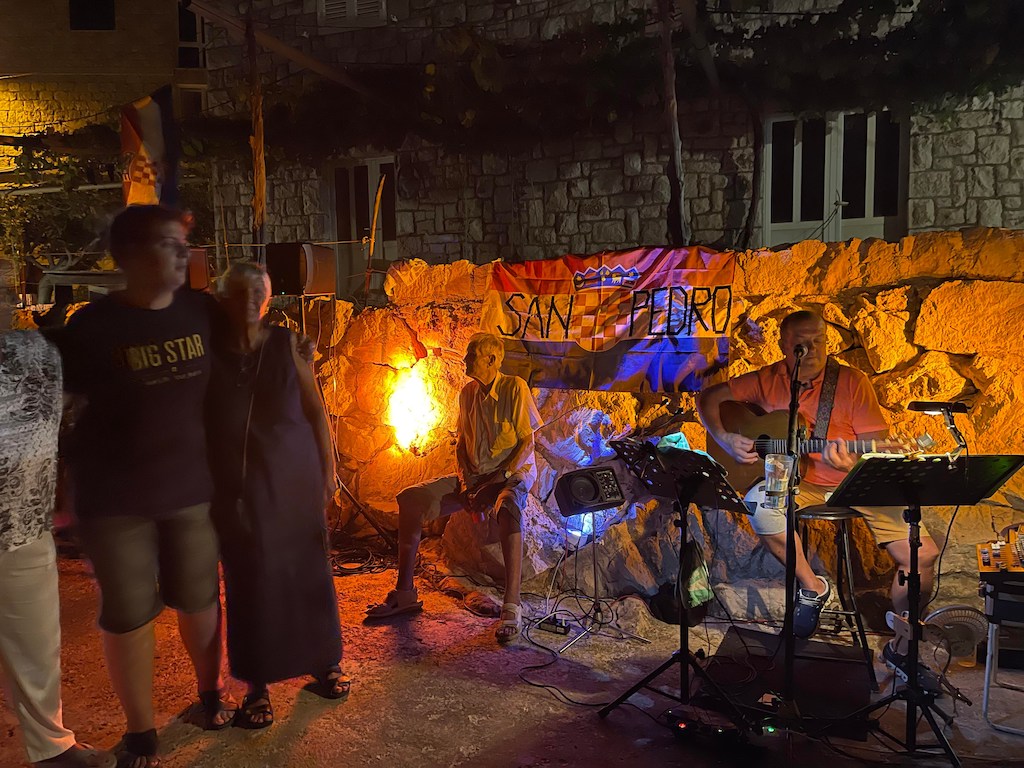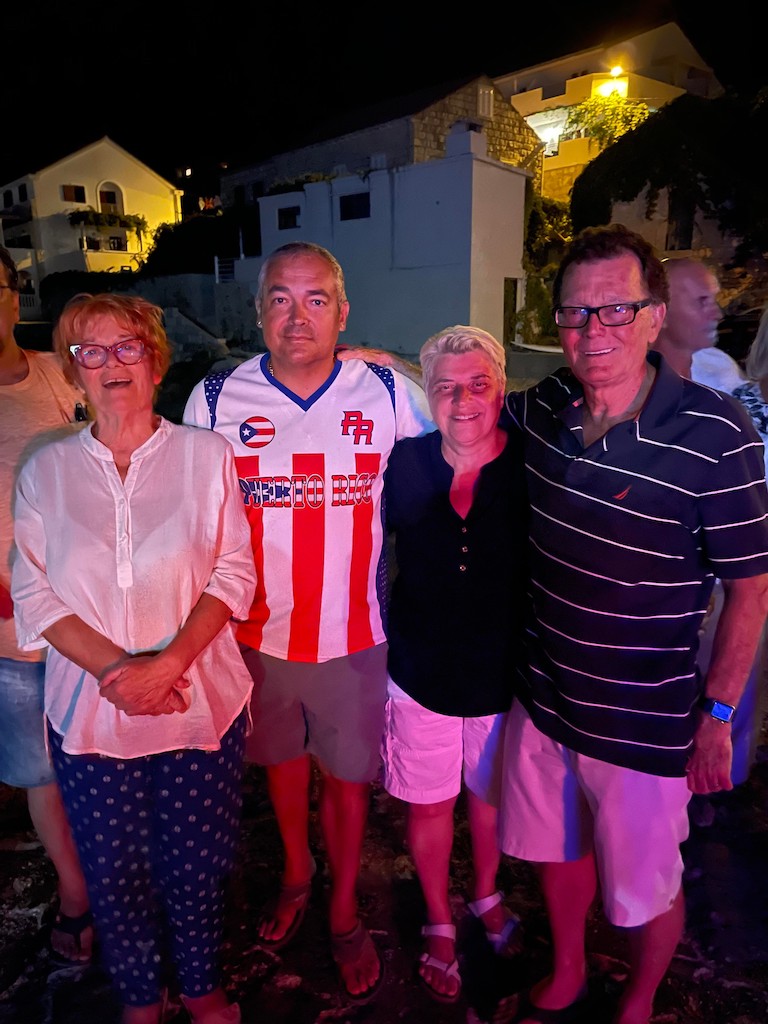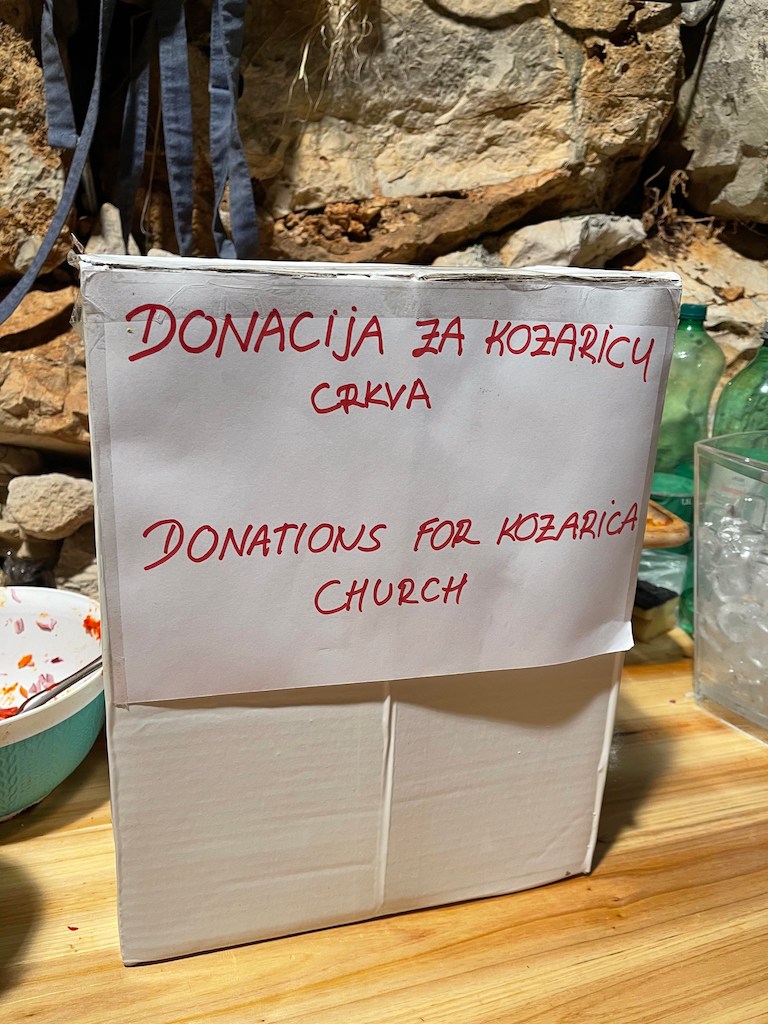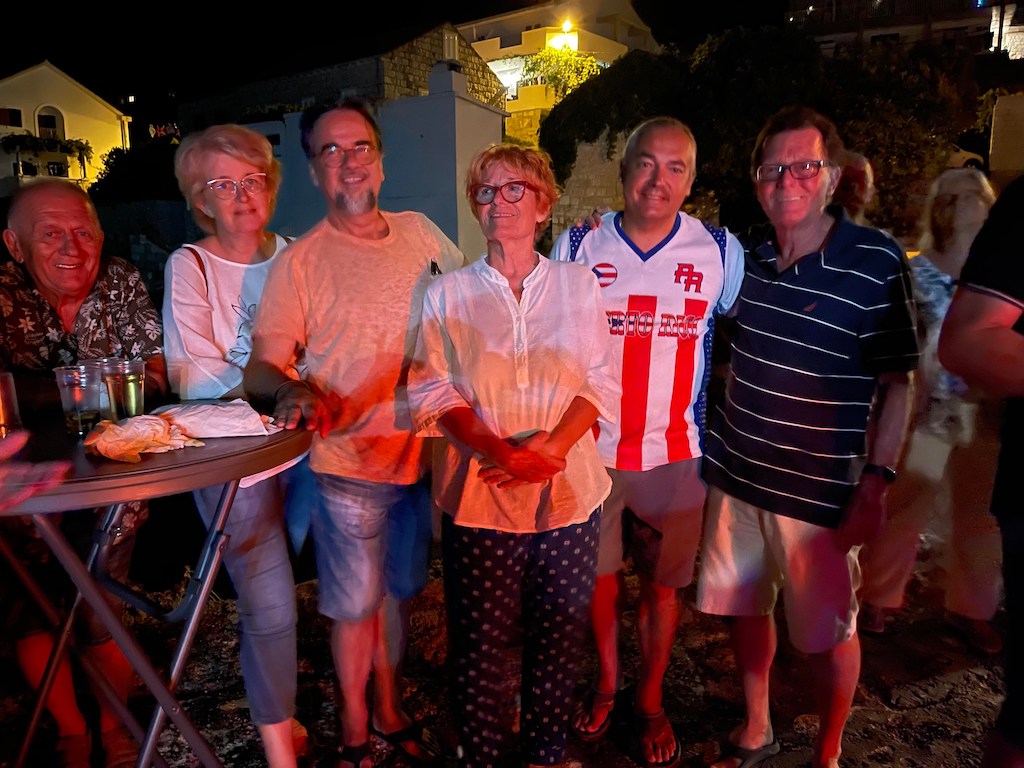Croatian Diaspora Celebrates Victory and Homeland Thanksgiving Day on Mljet
August 8, 2022 - Members of the Croatian diaspora from San Pedro, California, celebrated the Victory and Homeland Thanksgiving Day last Friday on the island of Mljet. A closer look at the celebration organized by Niko Hazdovac and his wife Lucija, the team behind San Pedro travel agency Adriatic Travel.
Niko Hazdovac, his wife Lucija, and their family run the successful travel agency Adriatic Travel in San Pedro, California. They host a celebration (fešta) every year the night before Victory and Homeland Thanksgiving Day and Day of Croatian Defenders in his small hometown of Kozarica on Mljet for his friends and locals. The fešta took place again last Friday.

“Everyone had a great time with the songs of the Dubrovnik pop artist Ilko Đivanović. With local food, Mljet wine, and good music, we danced until late into the night, and celebrated Oljua with fireworks,” said Ane Mljeċka, a well-known Croatian emigrant who was born on Mljet and now lives in the USA.

Every year the fešta organized by the American emigrants has a humanitarian aspect, and this year, donations were collected for the restoration of the church in Kozarica.

Victory and Homeland Thanksgiving Day and Day of Croatian Defenders commemorates the military victory on August 5, 1995, known as Operation Storm (Oluja), when the Croatian army took over nearly one-third of the Croatian territory occupied by the Serbian paramilitary forces and Yugoslav People’s Army (JNA). In only 84 hours of the military-police operation Oluja, in which almost 200 thousand Croatian soldiers participated and where over 10,000 square kilometers of the occupied territory was freed, the Croatian army restored sovereignty over occupied central and southern parts of the country, paving the way for the peaceful reintegration of eastern Croatia in January 1998.


What a night!
Photos credit: Ane Stražičić Rodriguez
For more, make sure to check out our dedicated lifestyle section.
Croatian Employees Shun Emigrant ''Return Incentive'' Measure
January the 23rd, 2022 - The demographic crisis in Croatia long predates the current coronavirus-induced one, although it certainly hasn't helped matters. Those Croatian employees who decided to remain in the country and not go chasing their luck abroad have some suggestions.
As Poslovni Dnevnik writes, an on online survey conducted on the posao.hr/job.hr portal on the topic "Will the incentive measure stimulate people to return or will it cause resentment among others?" brings some interesting results in which it is stated that as many as 78 percent of respondents don't support this incentive measure. Only 2 percent of respondents will encourage this incentive measure for people to return to Croatia, while 64 percent of them believe that the amount of financial incentive isn't enough to make such a big life decision.
The aim of the research was to examine the effect achieved by deciding on an incentive measure for people living and working outside of the Republic of Croatia and those who remained as Croatian working employees, living and working in their homeland.
The posao.hr portal conducted the aforementioned survey, in which 253 respondents participated, of which 73 percent are Croatian employees, 22 percent of them work abroad, and the rest have a foot in both rooms, being partly in Croatia and partly abroad.
There is a level of indignation from Croatian employees when it comes to these measures.
Adopting a measure that will encourage the return of young people back home to Croatia, according to the research, has had a negative effect on people who decided to stay and who are Croatian employees. As many as 61 percent of them believe that the adoption of this measure does not appreciate their decision to grit their teeth and stay in the country.
When asked whether, by that logic, Croatian employees who decided to remain here should also receive financial support to stay in the country themselves, 85 percent of them answered in the affirmative.
Only 11 percent of the respondents supported this return incentive measure, while 78 percent of them clearly said that they did not agree with the granting of this type of incentive to people simply to return to Croatia. The respondents employed abroad clearly agreed that the incentive is an insufficient reason to leave well-paid jobs they have elsewhere.
When asked whether this amount of money would encourage them to return home and leave a well-paid job abroad, 64 percent answered that the amount is too small with the comments "… is not the point of return a one-time payment, but a reasonable standard upon return instead?", "I was a craftsman in Croatia for more than 20 years. Anyone who has experience of entrepreneurship in Croatia knows that the stated incentive of 150,000 kuna would be "eaten" by the state in a single year. And then what?''
When asked whether the measure would encourage them to return, only 2 percent answered in the affirmative, which is a clear indicator of how successful this measure will be, or perhaps not.
For more, check out our lifestyle section.
HZZO: Search for Phantom Croatian Health Insurance Policy Holders Begins
January the 18th, 2022 - Following the release of the official results of last year's Croatian census, which revealed not only another worrying drop in numbers in terms of the population but other uncomfortable facts such as the sheer amount of those remaining people who drawing their pensions, it has turned out that there are very many ''phantom'' Croatian Health Insurance policy holders, too.
The hunt is now on to find 209,000 Croatian Health Insurance policy holders who aren't even registered as living in the country at all. HZZO (Croatian Health Insurance Fund) has its work cut out when it comes to cancelling the policies of all those who are still likely coming home for treatment but live elsewhere.
As Poslovni Dnevnik writes, despite the fact that the 2021 census has revealed that all of the country's counties as well as the City of Zagreb have fewer inhabitants than they had 10 years ago, Croatia still has 209,000 more Croatian Health Insurance policy holders than registered residents and more voters than adult citizens, writes Vecernji list.
According to the first results of last year's census, the Republic of Croatia has a maximum of 3,888,529 inhabitants, while on January the 3rd, 2022, it somehow had as many as 4,097,903 Croatian Health Insurance policy holders.
After the census, the voter register, which includes 3,690,623 adult citizens, will have to be "cleaned up".
Demographers have previously warned about issues caused by fictitious or ''phantom'' Croatian Health Insurance policy holders, explaining that they are most likely Croatian citizens or residents, Serbs who have left Croatia, Croats from neighbouring Bosnia and Herzegovina and Croatian citizens who emigrated but didn't ''check out'' of the system, and foreigners who own real estate in the country but don't live here.
It isn't possible to estimate just how many of these insured persons who aren't residents of Croatia use the so-called "free" healthcare, and how many are no longer here, don't use the system, and are only formally still registered with HZZO.
For more, check out our dedicated lifestyle section.
Book on Emigrants During Austria-Hungary and Kingdom of Yugoslavia Launched
ZAGREB, 6 Nov 2021 - A book about emigrants and returnees in the period of the Austro-Hungarian Empire and the Kingdom of Serbs, Croats, and Slovenes, that is the Kingdom of Yugoslavia, written by historian Darija Hofgräff Marić was launched in the Croatian State Archives on Friday evening.
The 210-page book deals with the emigration of the Croats in the second half of the 19th century and in the first four decades of the 20th century and particularly with the care for orphans of deceased expats.
The book reviewer, Professor Ulf Brunnbauer, whose research is mainly devoted to the social history of Southeastern Europe in the 19th and 20th centuries, said during the presentation of the book the emigration had been the Croatian continuity in the last 100 years.
Author Darija Hofgräff Marić said that her book focused on the legal and institutional framework of the protection of expats and returnees.
She also said that she found it irritating when emigrations were commented on only in negative terms. The processes of migrations have both good and bad sides, she said adding that her own experience had proven that. Hofgräff Marić, born in Zenica, Bosnia, and Herzegovina, began her tertiary education in Sarajevo in the 1989/1990 academic year, however, due to the war she had to leave Bosnia and Herzegovina and she finished that education in 2006 in Zagreb.
She said that the Croatians are prone to complaining about states and state institutions. However, not everything is up to the states and state authorities, and all of us have personal and civic responsibility and we can take bottom-up initiatives, Hofgräff Marić said.
For more about the Croatian Diaspora, visit our dedicated page here.
FM Thanks Int'l Community, Expats for Swift Quake Relief
ZAGREB, 2 January, 2021- Foreign Minister Gordan Grlic Radman on Saturday thanked the international community and Croatian emigrants for swiftly sending relief to those affected by a 6.2 earthquake in Sisak-Moslavina County, saying the government would not forget anyone affected.
Visiting the area struck on Tuesday, he told press in Lekenik the government was "pleasantly surprised" by the swift response of the international community and Croatian emigrants.
The government immediately requested the activation of the EU Civil Protection Mechanism, and more than half the member states responded in 24 hours, ready to help, said Grlic Radman.
Austria sent containers, Greece was the first to send a plane with 19 tonnes of relief, and Bulgaria and Poland have sent relief too, he said, adding that yesterday he spoke with colleagues from Europe, the Middle East, Asia and North America.
"They wanted to know what the situation was, if more assistance was necessary. They have shown great solidarity and empathy for our tragedy."
European Commission President Ursula von der Leyen immediately called the prime minister and all Croatian ministers were in contact with their EU colleagues, Grlic Radman said.
He especially thanked Croatian emigrants from Australia, America and Germany for responding swiftly and starting to collect aid, saying that reminded him of how it was in the 1990s Homeland War.
Commenting on Petrinja Mayor Darinko Dumbovic's dissatisfaction with the allocation of state funds after the tremor, Grlic Radman said "one should not politicise with millions."
Dumbovic said he would return the government's HRK 30 million in aid because political affiliation was being considered, rather than people and the damage.
"The government set aside that money to show at the beginning the desire, the will for the first rehabilitation to be carried out," he said, adding that "naturally" the government would see "what else is necessary."
Grlic Radman said the Interior Ministry had a well-established civil protection mechanism that was activated immediately. He pledged that all the relief necessary, from camp beds and lamps to containers and caravans, would continue to reach those affected by the tremor.
He underlined that the government would not leave anyone on their own, saying that all Croatian citizens must have a roof over their heads and heating.
"We are all here to help these people, to ease their pain. We can't bring back lives but we can help to reduce the pain, that people feel they are supported, that they are not alone, that they have not been abandoned, that they get a roof over their heads. In any case, we are there for them."


